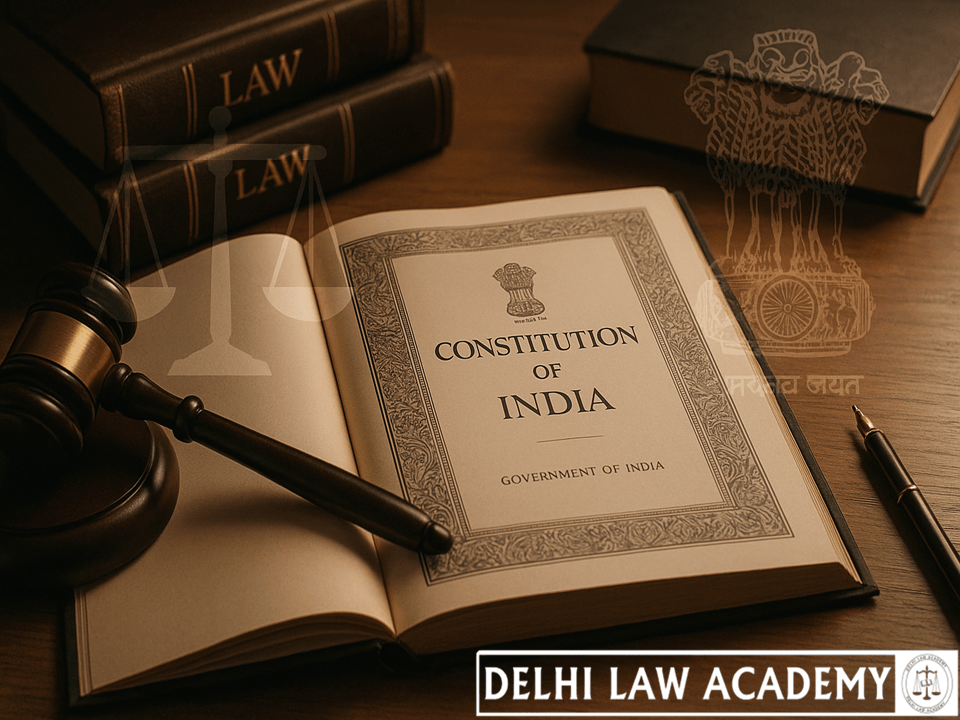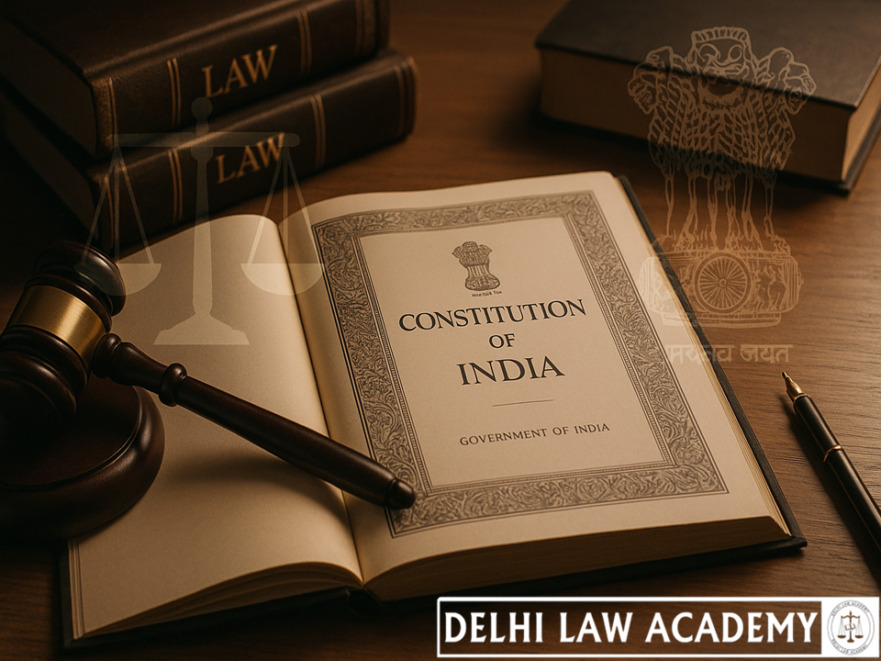
⚖️ Pardoning Power of President (Articles 72–75)
Delhi Law Academy Jaipur | Detailed Constitutional Notes for Judiciary Exams
📘 Topic Overview
Topics: Pardoning power of President • Council of Ministers • Executive Power of Union
Delhi Law Academy Jaipur presents below for aspirants of RJS, DJS, PCS(J) and other Judicial Services throughout India a short Note on the Pardoning power of the President and the Council of Ministers.
****************** Supreme Court discussed in this post: Maru Ram v Union of India • The power under Article 72 is to be exercised on the advice of the Central Government and not by the President on his own. Swaran Singh v State of U.P • it is true that it has no power to touch the order passed by the Governor under Article 161, but if such power has been exercised arbitrarily, mala fide or in absolute disregard of the “finer cannons of constitutionalism”, such order cannot get approval of law. K.M. Nanavati v State of Bombay • Governor granted reprieve under Article 161 which was held unconstitutional Epuru Sudhakar v. Govt. of A.P. • A limited judicial review of exercise of clemency powers is available to the Supreme Court and High Courts. ******************** Article 72 Pardoning power of President • President has the power o to grant pardons or remissions of punishment o to suspend, remit or commute sentences • of any person convicted o by a Court Martial o of any offence against a law on a matter within executive power of Union or o where the sentence is a sentence of death DLA’s comments on Articles 72 Effect of pardon • Grant of pardon wipes off the guilt of accused and brings him to the original position of innocence as if he had never committed the offence for which he was charged. • It affects both the punishment prescribed for the offence and the guilt of the offender. Maru Ram v Union of India • Constitutional Bench of Supreme Court held that the power under Article 72 is to be exercised on the advice of the Central Government and not by the President on his own, and that the advice of the Government binds the head of the Republic. Swaran Singh v State of U.P • Governor of U.P. had granted remission of life sentence awarded to the Minister of the State Legislature of Assembly convicted for the offence of murder. Supreme Court interdicted the Governor’s order and said that it is true that it has no power to touch the order passed by the Governor under Article 161, but if such power has been exercised arbitrarily, mala fide or in absolute disregard of the “finer cannons of constitutionalism”, such order cannot get approval of law and in such cases, “the judicial hand must be stretched to it.” The Court held the order of Governor arbitrary and, hence, needed to be interdicted. K.M. Nanavati v State of Bombay • Governor granted reprieve under Article 161 which was held unconstitutional as it was in contrast with the Supreme Court rulings under Article 145. Epuru Sudhakar v. Govt. of A.P. • It is a well-set principle that a limited judicial review of exercise of clemency powers is available to the Supreme Court and High Courts. • Granting of clemency by the President or Governor can be challenged on the following grounds: o The order has been passed without application of mind. o The order is mala fide. o The order has been passed on extraneous or wholly irrelevant considerations. o Relevant material has been kept out of consideration. o The order suffers from arbitrariness. Article 73 Executive Power of Union • Executive power of Union extends to: o all matters enumerated in the Union List o those matters in Concurrent List where expressly so provided by Constitution or Parliament o rights and authority by virtue of any treaty or agreement with other countries Article 74 Council of Ministers • Council of Ministers with PM at the head o to aid and advise the President o who shall act in accordance with such advice • President may return the advice for reconsideration o but the subsequent advice is binding • Such advice is not to be inquired into by any court Other provisions as to Ministers Article 75(1) • Prime Minister is to be appointed by President o Other ministers are to be appointed by him on advice of PM Article 75(1A) • Number of ministers o not to exceed 15% of total members of Lok Sabha Article 75(1B) • An MP disqualified under Tenth Schedule o is not to be appointed as Minister Article 75(2) • Ministers to hold office during pleasure of President Article 75(3) • Council of Ministers is collectively responsible to Lok Sabha Article 75(5) • A minister who is not an MP for 6 months o ceases to be a minister Article 75(6) • Salaries of ministers are to be determined by Parliament Question: • Is it essential to have a Council of Ministers under Article 74(1) even at a time when the House of the People has been dissolved or its term has expired? **********************
📚 For complete notes on the Constitution & Judiciary Exams, visit Delhi Law Academy
📘 Stay Ahead with Delhi Law Academy!
Get access to free monthly current affairs, read our insightful blogs,
and explore free study resources prepared by experts at DLA Jaipur. 🚀
💬 FAQs — Pardoning Power of the President (Articles 72–75)
Important long-tail questions for RJS, DJS & PCS(J) aspirants about Articles 72–75 — Presidential pardons, judicial review, and the Council of Ministers.
This applies to persons:
- Convicted by a Court Martial
- Convicted of offences under Union executive jurisdiction
- Sentenced to death
Search term: “Pardoning power of President Article 72 explained”
It removes both the punishment and guilt attached to the conviction.
Search term: “Effect of pardon by President Article 72 judiciary notes”
The President cannot act on his own discretion in matters of pardon or clemency.
Search term: “Can President exercise pardoning power without advice of Council of Ministers”
In Epuru Sudhakar v. Govt. of A.P., the Supreme Court held that clemency decisions can be challenged on grounds of:
- Mala fides (bad faith)
- Arbitrariness or extraneous considerations
- Non-application of mind
- Exclusion of relevant facts
Search term: “Judicial review of President pardon Epuru Sudhakar case”
The President may return the advice for reconsideration once, but must act according to the reconsidered advice.
This advice cannot be questioned in any court.
Search term: “Role of Council of Ministers in pardoning power Article 74 explained”
The Governor exercises a similar power under Article 161 for offences under the State List.
However, both are subject to judicial review if misused.
Search term: “Difference between President and Governor pardoning power Article 72 vs 161”
📘 For more notes on Indian Polity and Constitutional Law, visit
Delhi Law Academy
Contact us
📍 Delhi Law Academy – Jaipur Branch
6C, Tower 2, Coaching Hub, Pratap Nagar, Jaipur – 302033
📞 Phone:
+91 9911916552
+91 8447285606
✉️ Email:
contactus@delhilawacademy.com

